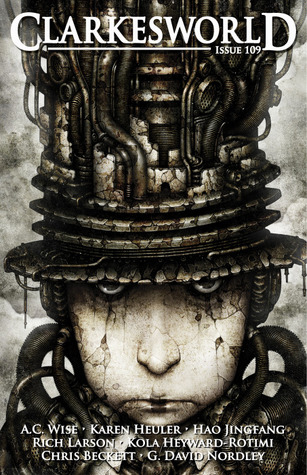Short Speculative Fiction: “Summer at Grandma’s House” by Hao Jingfang
 |
Lately I’ve felt like using this column to cover fewer pieces of fiction, but more in depth. So for the time being I’ll write about one story per column, picking my favorites from a given magazine.
In this month’s Clarkesworld, I very much enjoyed the short story “Summer at Grandma’s House” by Hao Jingfang, originally published in 2007, and translated into English by Carmen Yiling Yan.You can read it for free right now at Clarkesworld.
Briefly, what it’s about: a young man drifting aimlessly through life who visits his grandmother for the summer. This place is not what you’d expect: “The coffeepot is a penholder, the penholder is a lighter, the lighter is a flashlight, the flashlight is a jam container.” The story has to do with what he learns about the meaning of life in this house. From here on in, we delve into spoilers, so click on (either to the story or the rest of the column).
I’m particularly moved by this story because it’s about destiny and the meaning of life in the most un-melodramatic way imaginable. It has something to say, a message if you like, but it goes about its didactic task with warm characterization and — most crucially — it’s a story that makes sense.
The main character’s aimless, and his aimlessness concerns everybody, including him. When he goes to live with his grandmother, his mother encourages him, but with implicit criticism in her words: “Find someplace to fix up your spirits… and come back ready for another go.” The mother’s message is clear: There’s something wrong with you, kid.
However, Grandma makes an art out of aimlessness. She’s a brilliant inventor who works with reverse transcription enzymes. As a scientist, she “rejects any form of teleology,” such that “eyes grew eyelashes to keep dust out.” We come from a long line of pointless mutations — so why ask what our destiny in life is? Or why not ask?
It’s an age-old theme of science fiction to deal with our place in a big, scary, meaningless cosmos. This story fits firmly in the genre, not so much for the ways it pushes the boundary of science (though Grandma is an innovator), but for the questions it asks about how we live our lives in the universe that science reveals.
It’s a scary message — that we come from mutations. Or at least it scares me. But the peculiar grace of this story is how warm and human it seems despite this somewhat off-putting message. During the summer at Grandma’s, the boy makes mistake after mistake after mistake. But Grandma, a kind soul if there ever was one, uses each mistake as an opportunity to further her scientific research and improve their lives. By the end of the story, a series of amusing conflicts (starting with a door that won’t open), has culminated into an epiphany that everything has somehow worked out for the best. Yet this cheerful conclusion never feels manipulated by the author, but rises out of the narrative engine she has set to humming in this story. Modest and simple and plausible circumstances lead to a modest, simple, and plausible happy ending.
This isn’t just a story about mutation and chance — full stop. It’s about how we interpret mutation, and what we do with the random things in our lives. “We always think we can choose our future, but that’s not true,” the boy realizes, “what we can really choose is our past.”
Black Gate covers all the major fantasy magazines. Check out the Black Gate October Fantasy Magazine Rack here, and all our current magazine coverage — with updates on 30 ongoing publications — is here.
Learned Foote’s last article for us was Short Speculative Fiction: An August Roundup.